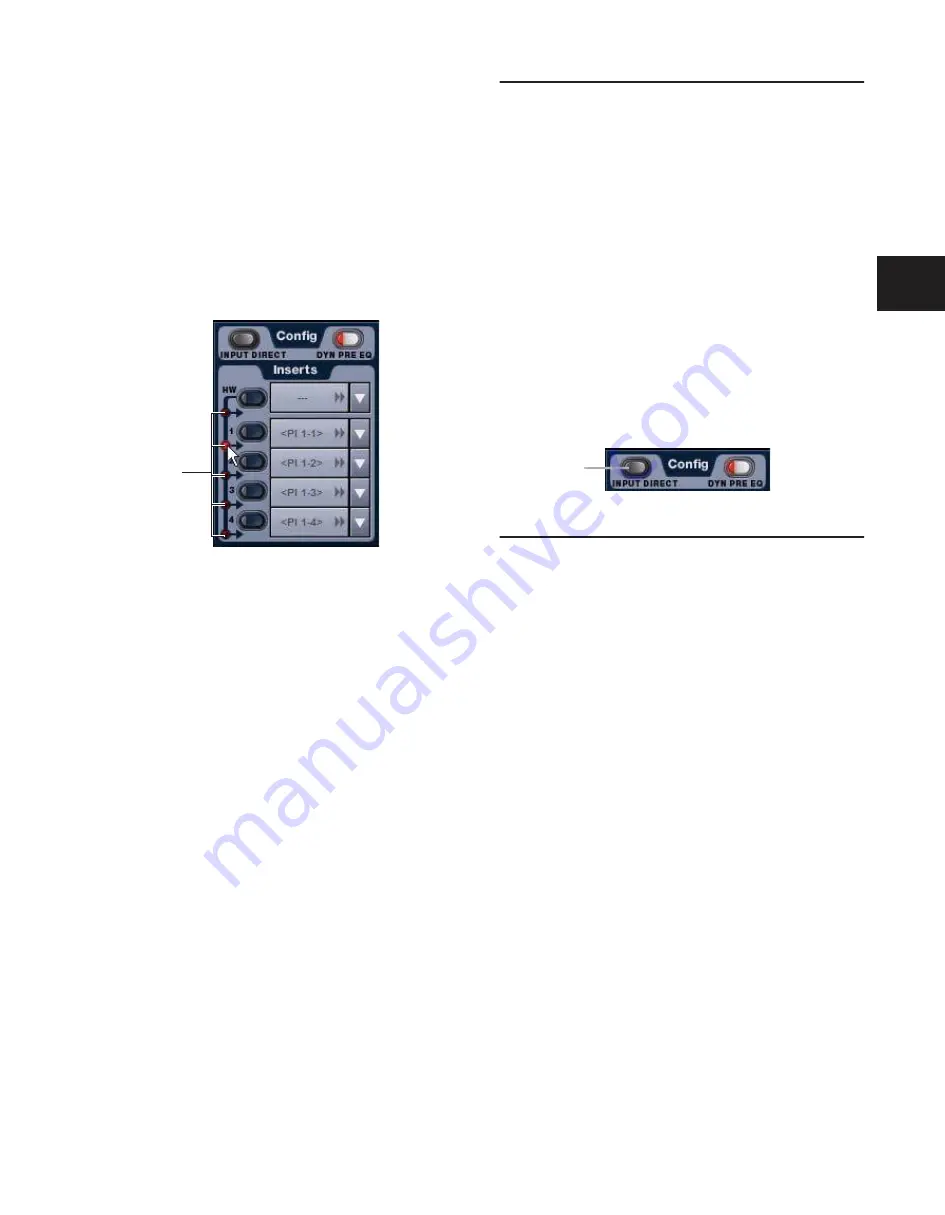
Chapter 7: Inputs and Input Routing
65
Setting the Hardware Insert Location
You can choose the location of the hardware insert in the sig-
nal path, relative to the four plug-in inserts, for each channel.
A hardware insert does not need to be currently assigned to do
this.
To set the hardware insert location:
1
Go to the Inputs page and target the channel where you
want to set the hardware insert location.
2
In the Inserts section of the Inputs page, click the hardware
insert indicator so that it lights red.
Activating and Bypassing Inser ts
After hardware and plug-in inserts are assigned, they can be
activated and bypassed from the from the ACS section or the
corresponding Input page controls.
To activate or bypass a plug-in insert from the ACS section:
1
Target the channel by pressing its Select switch.
2
Press any of the Plug-In switches in the Insert Processing
section to activate or bypass the corresponding Insert. The
switch lights when the insert is activated.
To activate or bypass a hardware insert from an Input Channel or
FX Return:
1
Go to the Inputs page and target the channel.
2
Click the In/Out switch for the HW insert (at the top of the
Inserts section) on the channel. The switch lights when the in-
sert is in-circuit.
Using Input Direct
Input Direct mode lets you completely bypass the built-in dy-
namics and EQ processing, and all inserts on Input Channels
and FX Returns. This mode routes the input signal directly
from the Top of Channel pickoff to the channel fader.
Input Channels
Input Direct bypasses the HPF, built-in dynam-
ics and EQ, plug-in inserts, and the hardware insert point on
Input Channels.
FX Returns
Input Direct bypasses the built-in EQ, plug-in in-
serts, and the hardware insert point on FX Returns.
To bypass all processing on an input channel:
1
Target the channel by pressing its Select switch.
2
Click the Input Direct button in the Config section of the
Inputs page for the selected channel. The button flashes to in-
dicate Input Direct mode is active.
Adjusting Input Controls
Input Gain
Input Gain is adjustable from the rotary encoders on each In-
put Channel and FX Return. Mic inputs have a gain range
from +10 dB to +60 dB. Analog line inputs and digital inputs
have a gain range from –20 dB to +18 dB.
Gain Guess Feature
An automated Gain Guess function can be used to set a nom-
inal level for a channel based on its incoming signal. When
you press and hold the rotary encoder assigned to control gain
(either the input encoders or the Input Gain encoder in the
ACS section), the system samples incoming signals and auto-
matically sets the channel gain and pad for a 0 dB reference
when the encoder is released. Gain Guess follows the current
Meter mode (Peak or RMS).
Gain Indicators
When Gain is displayed on the input encoders, the encoder’s
indicator LED lights to indicate that the gain is set to the de-
fault value (+10 dB for analog inputs, and 0 dB for digital in-
puts). Gain change is indicated by the encoder ring LEDs, and
gain value is shown in the channel display.
Setting a hardware insert location in the Inputs page
Click to set
HW Insert
location
Setting a hardware insert location in the Inputs page
Input Direct
Summary of Contents for D-Show Profile
Page 10: ...D Show Profile Guide x ...
Page 11: ...Part I Overview and Installation ...
Page 12: ......
Page 16: ...D Show Profile Guide 6 ...
Page 32: ...D Show Profile Guide 22 ...
Page 33: ...Part II System Description ...
Page 34: ......
Page 50: ...D Show Profile Guide 40 ...
Page 58: ...D Show Profile Guide 48 ...
Page 67: ...Part III Signal Routing ...
Page 68: ......
Page 94: ...D Show Profile Guide 84 ...
Page 102: ...D Show Profile Guide 92 ...
Page 110: ...D Show Profile Guide 100 ...
Page 134: ...D Show Profile Guide 124 ...
Page 135: ...Part IV Processing ...
Page 136: ......
Page 144: ...D Show Profile Guide 134 ...
Page 171: ...Part V Shows ...
Page 172: ......
Page 180: ...D Show Profile Guide 170 ...
Page 204: ...D Show Profile Guide 194 ...
Page 227: ...Part VI Specifications ...
Page 228: ......
Page 236: ...D Show Profile Guide 226 D Show Output Signal Flow Diagram Version 1 3 07 07 05 ...
Page 245: ...Part VII Reference ...
Page 246: ......
Page 258: ...D Show Profile Guide 248 ...
Page 269: ......
















































